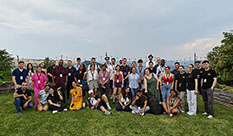More:
News & Stories
Electric vehicles will make mechanics unemployed
Technological advances and the assimilation of new developments within old industries, are creating changes in the labor market. Therefore, there is an urgent and vital need to establish a strategic master plan to map the necessary technologies and skills and to formulate them into curricula that will include courses, trainings and advanced training, which will ensure that employees of the automotive mechanics industry, as well as other industries, do not become unemployed.

Electric vehicles illustration. photo: pixbay pexels
There are more than 5,000 licensed garages in Israel that employ more than 60,000 Israelis who are responsible for the proper maintenance of the vehicle fleet in Israel, which includes more than 2.5 million vehicles.
Today most of the garage revenue is from servicing mechanical systems, such as engines, gearboxes and more.
The automotive world, which is moving towards autonomous vehicles, is based on many sensors such as: cameras, radar, laser and electronic and electro-optical systems for the benefit of driver and passenger monitoring, diverse applications for creating a user experience, cloud connection, many vehicle-to-vehicle communication systems, computing systems for the application of artificial intelligence will completely change the skills required to care for vehicles and will require a change in the form of training for this working public. Without state intervention and without an orderly strategic plan on the subject - in the not too distant future.
The digital revolution and technological advancement that has characterized the last few decades, requires many traditional industries and trading bodies to reinvent themselves in order to remain competitive and profitable and not be left behind in the race for progress. Therefore, it must be ensured that digitalization will benefit the majority of the population, encourage innovation and development and help address global challenges.
There is an urgent and vital need of the state to take command and to establish a strategic master plan of the Ministry of Economy, together with the academia, the technological industry, the Innovation Authority and the Garage Association. Such a program must map out the necessary technologies and skills and formulate them into curricula that will include courses, trainings and advanced training, which will ensure that today's garage workers will not become the unemployed of tomorrow.
In order to train the existing workforce, dedicated curricula must be built that will receive the blessings of the Council for Higher Education, which has already realized that the process of the digital revolution is gaining momentum and that it should not be taken lightly.
The automotive industry, which is currently mostly mechanical and not technological - will change and it is important to recognize this. In addition, the garage industry in Israel, consists of thousands of small and independent businesses. In this case, the state must generate awareness to the issue among the garage workers themselves to encourage them to acquire knowledge under the various programs they will be offered.
The state must help organizations develop appropriate infrastructure at reasonable costs on the one hand and prevent the erosion of quality manpower on the other. In recent years, the Innovation Authority has encouraged the development of digital technologies with the aim of assimilating them into traditional industries with a concern not be left behind.
Of course, this kind of integration of academia together with the traditional industries, with the support of the Innovation Authority and other factors, can accelerate the digital revolution and contribute to strengthening the Israeli economy and closing social and socio-economic gaps.

Prof. Yosef Ben Ezra
Dean of the Faculty of Engineering at HIT Holon Institute of Technology
Photo: Sivan Farage
Posted: 29/06/2021
- News & Events
International Week of Interdisciplinary Studies and Academic Collaborations in Crete
A substantial delegation of 16 students and four faculty members from HIT Holon Institute of Technology participated in week-long international activities and events at HMU-Hellenic Mediterranean University in Crete. ...


 Additional programs
Additional programs
